AGS offers a complete range of systems for boiler plant safety—from emergency gas shut-off buttons and gas solenoid valves to CO interlocks that trigger boiler shutdown in unsafe conditions. For more advanced applications, our zone monitoring panels with remote gas detectors provide continuous monitoring of natural gas, CO, and other hazards, ensuring safe operation and full compliance in boiler and mechanical rooms.
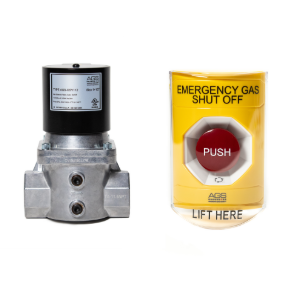
Emergency Gas Shutdown
Find Out More
This is your basic CSD-1 safety setup in a mechanical room to isolate gas or power to the boilers in an emergency.
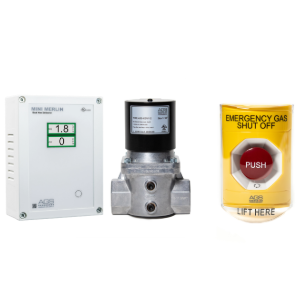
Emergency Gas Shutdown with Gas Detection
Find Out More
Meet CSD-1 and protect the mechanical room with gas detection. For rooms smaller than a 25 yard radius, add a Mini Merlin to the emergency panic button circuit to provide combustible gas & carbon monoxide monitoring.
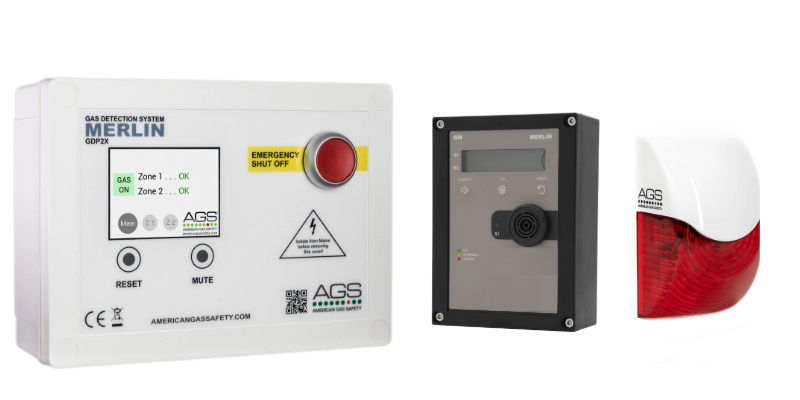
Multi-Zone Gas Detection System with Emergency Gas Shutdown (8 Zone)
Find Out More
Merlin GDP2X, eight zone gas detection system. Control up to 8 remote sensors with status display & communicate condition with building management system through a SPDT relay. Emergency boiler or gas shutdown can be achieved by adding external solenoid valves or relays.
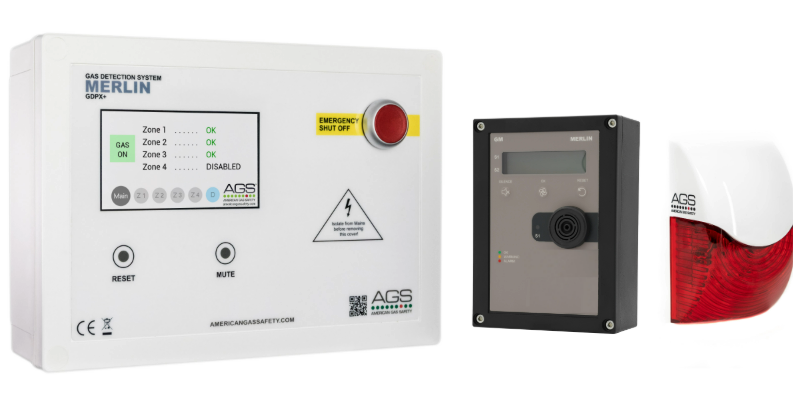
Multi-Zone Gas Detection System with Emergency Gas Shutdown & Gas Pressure Proving (16 Zone)
Find Out More
Merlin GDPX+, sixteen zone gas detection system. Control up to 16 remote sensors with status display & communicate condition with building management system through a SPDT relay or MODBUS. Emergency boiler or gas shutdown can be achieved by adding external solenoid valves or relays.
What Are The Code Requirements?
ASME CSD-1
‘(b) A manually operated remote shutdown switch or circuit breaker shall be located just outside the boiler room door and marked for easy identification.
(1) Consideration should be given to the type and locations of remote shutdown switch to safeguard against tampering. If the boiler room door is on the building exterior, the switch should be located just inside the door. If there is more than one door to the boiler room, there should be a remote shutdown switch located at each door.
(2) Activation of the remote switch or circuit breaker shall immediately shut off the fuel or energy supply.’
Florida Compliant - Rule Chapter: 69A-70
- 509.211 Safety regulations(4) Requires that every enclosed space or room that contains a boiler regulated under chapter 554 which is fired by the direct application of energy from the combustion of fuels and that is located in any portion of a public lodging establishment that also contains sleeping rooms shall be equipped with one or more carbon monoxide sensor devices that bear the label of a nationally recognized testing laboratory and have been tested and listed as complying with the most recent Underwriters Laboratories, Inc., Standard 2034, or its equivalent, unless it is determined that carbon monoxide hazards have otherwise been adequately mitigated as determined by the division. Such devices shall be integrated with the public lodging establishment’s fire detection system. CO METERS by set to shut boiler off and 35ppm and Must have a Manual Reset.
2022 Rules & Regulations of the State of Georgia - Rule 120-3-26-.07
120-3-26-.07 (10) – State Inspection Fees New Installation of Boilers and Installation of Secondhand Boilers or Pressure Vessels
(a) Each boiler room containing one or more boilers or hot water heaters or pressure vessels from which carbon monoxide can be produced shall be equipped with a carbon monoxide detector with a manual reset. The requirements of this subsection apply to boiler rooms in which new installations or re installations of one or more boilers are completed.
(1) The carbon monoxide detector will alarm at 50 ppm and boiler(s) shall be interlocked to disable the burners when the measured level of carbon monoxide rises above 200 ppm.
(2) The carbon monoxide detector shall disable the burners upon loss of power to the detector.
(3) When the carbon monoxide detector trips in the boiler room, the detector should be interlocked with all boilers or hot water heaters or pressure vessels installed in the space to secure the fuel burning equipment thus stopping the production of carbon monoxide.
(4) The carbon monoxide detector shall be calibrated every eighteen months after installation or in accordance with the manufacturer’s recommendations, whichever is more frequent. A record of calibration shall be posted at or near the boiler or be readily accessible to an inspector.
(5) The carbon monoxide detector shall be installed and function in accordance with all other regulations and standards adopted by the Commissioner.
(6) Any boiler room that is monitored by a full-time boiler operator is exempt from the safety shutdown, as defined in ASME CSD-1. The presence of a full-time boiler operated does not exempt such boilers from the alarm requirement.
New York Chapter 908-01 - Carbon Monoxide Detectors
§908-01 Carbon Monoxide Detectors.
(a) Scope. Pursuant to sections 908.7.2 and 908.7.3 of the Building Code (BC), listed carbon monoxide (CO) detectors required to be installed in E, I-2 and I-4 occupancies and in buildings equipped with a fire alarm system that contain Group A-1, A-2, A-3, B or M occupancies, as defined in BC Chapter
3, must be installed in accordance with the requirements of this section.
(1) These requirements do not apply to those R-2 occupancies that are adjacent to or above those occupancies classified in this section.
(2) Pursuant to BC section 908.7.3.1, existing buildings must comply with the requirements of this subdivision by July 1, 2021.
(b) Reference. See section 28-315.11 of the New York City Administrative Code (AC), and BC sections 908.7.2, 908.7.3, 908.7.3.1 and 908.7.4. (c) Group E, I-2 and I-4 occupancies. CO detectors with built-in sounder bases installed in E, I-2 and I-4 occupancies in accordance with BC 908.7.2 must be installed in the following locations:
(1) Any room containing carbon monoxide-producing equipment, except kitchens and laboratories.
(2) Any corridor on the story where carbon monoxide-producing equipment unit is located, as well as one story above and one story below.
(d) Group A-1, A-2 and A-3 occupancies. CO detectors with built-in sounder bases installed in buildings that are equipped with a fire alarm system and that contain A-1, A-2 or A-3 occupancies must be installed in the following locations:
(1) Any room containing CO-producing equipment, except kitchens.
(2) Any occupiable room or space on the same floor as, one story above, or one story below the CO-producing equipment that is at least 75 square feet and is not provided with mechanical ventilation.
(e) Group B and M occupancies. CO detectors with built-in sounder bases installed in buildings that are equipped with a fire alarm system and that contain Group B or M occupancies must be installed in the following locations:
(1) Any room containing CO-producing equipment, except kitchens.
(2) Any corridor on the story where carbon monoxide-producing equipment unit is located, as well as one story above and one story below.
(6) Detection zones:
(i) Detection zones less than 10,000 square feet. Where carbon monoxide detection is required to be provided in a detection zone having an area less than 10,000 square feet, the carbon monoxide detection shall be placed in a central location within such detection zone.
(ii) Detection zones 10,000 square feet or greater. Where carbon monoxide detection is required to be provided in a detection zone having an area 10,000 square feet or greater, carbon monoxide detection shall be placed in a central location within such detection zone and at such additional locations with such detection zone as may be necessary to assure that no point in the detection zone is more than 100 feet from carbon monoxide detection.
(f) Equipment shutdown. Activation of a CO detector located at the source of CO-producing equipment must shut down that source. This provision does not apply where the source is a generator.
(g) Installation requirements. CO detectors must be installed in accordance with NFPA 720 – 2015 edition, as modified for New York City by this section.
(h) Fire alarm control units. The provisions of section 23.8.2.2 of NFPA 72 – 2010 regarding having a separate panel apply to CO detectors.
16 Texas Administration Code (TAC) Chapter 65
‘Each boiler room containing one or more boilers from which carbon monoxide can be produced shall be equipped with a carbon monoxide detector with a manual reset.
(1) The carbon monoxide detector and boiler(s) shall be interlocked to disable the burners when the measured level of CO rises above 50ppm.
(2) The carbon monoxide detector shall disable the burners upon loss of power to the detector.
(3) The carbon monoxide detector shall be calibrated in accordance with the manufacturer’s recommendations or every eighteen months after installation of the detector. A record of calibration shall be posted at or near the boiler, or be readily accessible to an inspector.
(4) The requirements in this subsection apply to boiler rooms in which need installations or re-installations of one or more boilers are completed on or after September 1, 2020.’
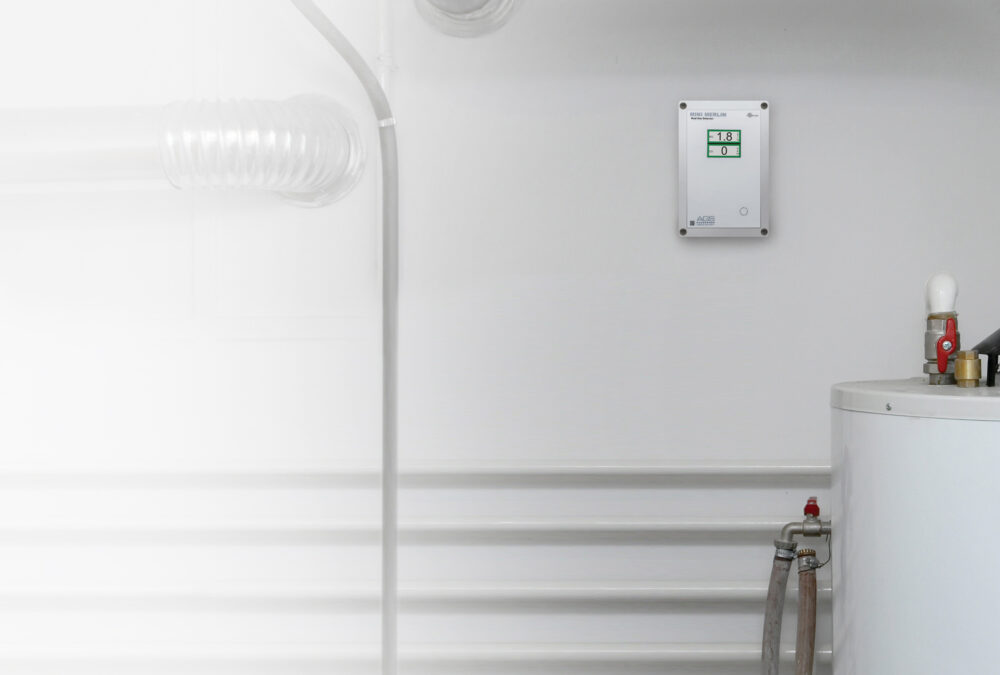
Need more info? Check out our most frequently asked questions below.
FAQs
I have multiple boilers, how many gas detectors do I need?
If all boilers are located within a 25 foot radius from where a gas detector would be placed, then only one detector is needed. If boilers fall outside of this range, then multiple detectors will be needed.
What gases do I need to detect for in a boiler room?
The most common gases to detect are Carbon Monoxide (CO) and Natural Gas (CH4) or Propane (LPG), depending on the gas fueling the water heater / boiler.
What is the most common gas detection system for a boiler room?
For boiler rooms with boilers located within a 25-foot radius, the standard setup includes a Mini Merlin dual gas detector, an emergency stop button, and a gas solenoid valve installed upstream of all appliances. For larger boiler rooms, the GDP system is a more suitable solution.
What is the lifespan of a gas sensor in a boiler room?
The lifespan of a CO sensor is approximately 7-10 years, and Natural Gas is about 10 years; both depending on environmental factors.
How often do sensors need to be tested?
It is recommended to bump test any detector every 12-18 months to ensure they are accurate and not affected by sensor drift. After a few years, calibration may be required. Check with your local AHJ.








